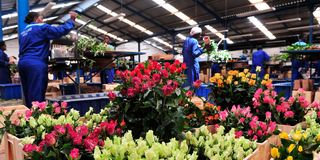Cut flower exporters decry high cost of doing business

Workers at the Maridaidi Farm in Naivasha, prepare roses for export to Europe in this past photo.
Cut flower exporters in the country have raised concerns over increased water charges and payroll costs that have raised the cost of doing business, eroding their competitiveness.
The exporters say the increasing taxes and charges, logistical difficulties and additional operational costs have drained gains they would accrue from high sales after exporting to outside markets owing to the strengthening of the dollar against the Kenyan shilling.
Their main complaint is a recent increase in water charges from Sh0.5 to between Sh2 and Sh6 for irrigation and commercial use and an increase in National Social Security Fund (NSSF) contributions from Sh200 up to Sh1,080 on the employers’ side.
“Water charges have risen from the previous 50 cents to between Sh2 and 6 for irrigation and commercial use. And, as you are aware, floriculture is a heavy user of water. This increase, therefore, compounds the existing situation in the sub-sector. And energy cost is expected to increase soon,” said Kenya Flower Council (KFC) Chief Executive Clement Tulezi.
The council laments that factors including high freight charges and many taxes on the sector last year saw Kenya’s flower exports drop by 15,000 tonnes, from the 210,000 tonnes exported in 2021.
“On average, growers are paying up to 45 levies between the national and county governments. Current levies have a huge negative impact on the sector threatening jobs and livelihoods. The sector is willing to pay taxes, but too many levies that also have no public/users participation are posing a big challenge to the sector,” Mr Tulezi said.
Indicating that many growers are in a cash crunch despite the government’s holding of Sh12 billion in VAT refunds, the council also raised issues with a recent increase in NSSF contributions that takes effect this month, which it says will have huge implications on employers’ payroll costs.
“For our sector, this has a huge impact because flower farms are big employers, some employing over 10,000 people. This is a sudden increase in recurrent expenditure that cannot be absorbed in the current situation,” said Mr Tulezi.
Potential growers
The sector says it has been neglected by the government despite its economic contribution, calling on national and county governments to lend their support.
It challenged the government to create more incentives to attract potential growers from the west, who will bring in more activity and create jobs.
Kenya’s horticulture sector earned the country Sh154 billion in 2021, with flowers alone bringing in Sh110 billion.
The sector employs over 200,000 Kenyans directly, according to KFC, with an additional one million people directly engaged in the supply of goods and services.
“Today, the industry is struggling. The margins are shrinking by the day. Growers are struggling to supply the market and maintain Kenya’s position as a key producer of cut flowers and ornamentals,” Mr Tulezi said.





